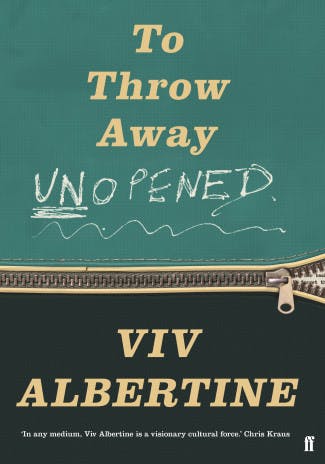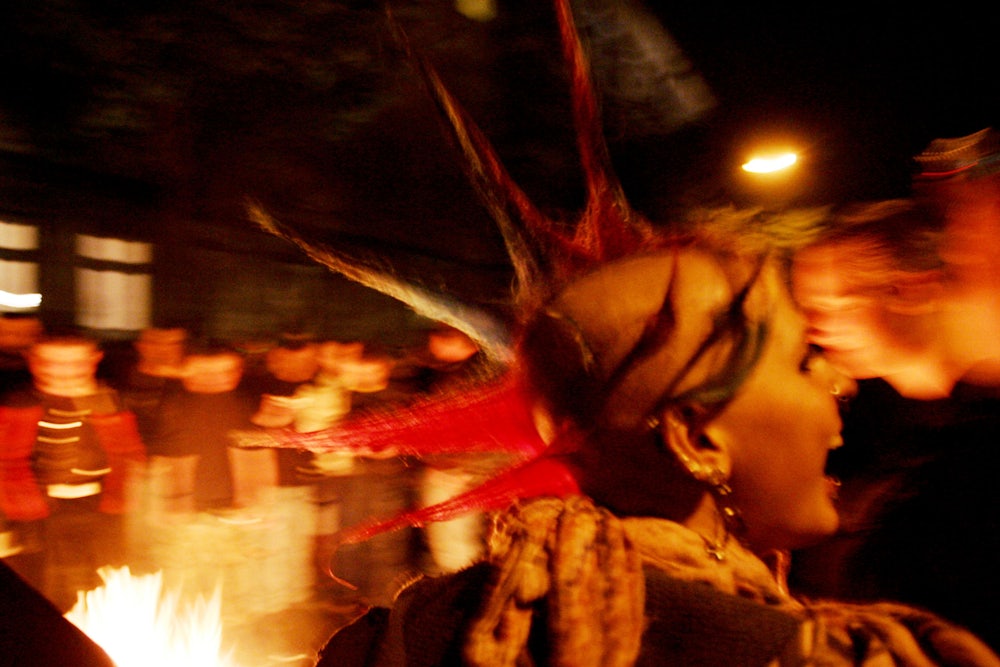“Anyone who writes an autobiography is either a twat or broke,” Viv Albertine, guitarist for the all-female punk band The Slits, wrote in the introduction to her first book Clothes, Clothes, Clothes. Music, Music, Music. Boys, Boys, Boys.: A Memoir, which came out in 2014. “I’m a bit of both.” Cynicism and sympathy wrapped in a self-deprecating sneer, it was a distinctly British opening to the brash, sometime brutal story of a working-class girl’s coming of age in London in the 1960s and ‘70s.
Clothes, music, boys: Shallow obsessions, says Albertine’s mother, but they are what builds this girl and offers her excitement, escape, and self-discovery. The boys are often disappointments, their hygiene even less evolved than their attitudes towards women. In one vignette titled “Blow Job,” young Viv gamely offers her services for the first time to her pal Johnny Rotten, familiar enough with unwashed genitalia to be unfazed by the opportunity, until she hears an “imperious voice from on high” telling her to stop: “You’re trying too hard.” It’s funny, but the scene is telling: Throughout her career, she’s desperate to learn, to participate, to be good. Without a map, she picks up what she can from boys who want her to stand in the wings or, at best, at the side of the stage, looking pretty. Yearning to be a part of things, she tells Paul Weller that she’s a guitarist, only to hear in reply, “Good. We could use some crumpet in our band.”
Instead, Albertine finds her own gang: the Slits, a rare all-girl band fronted by the singer Ari Up, who was fourteen years old when the band played their first gigs in 1977. Like the songs they wrote, Albertine’s stories of this era are discordant and in-your-face, revealing in short, intense bursts how the punk scene came together via art school students, shabby squats, and “the Shop,” Vivienne Westwood and Malcolm McLaren’s boutique Sex, on the King’s Road—part hangout, part shrine, staffed by assistants in fishnets and bondage gear.
There are plenty of before-they-were-famous thrills, standard issue for a rock-star memoir. There’s the funny-looking boyfriend from art school, Mick, whose latest band, the Clash, seems pretty good; there’s John’s mate Sid who hasn’t joined his band yet and hasn’t yet earned the nickname “Vicious.” But Albertine’s celebration of the moment before the scene got big, when the line of safety pins in your pants was there to save them from ripping apart, mostly resists cliché. She is determined to put “punk” in its proper place in the course of a whole life, from childhood to marriage, through cancer and IVF, motherhood and divorce, and back around to creativity in new forms: filmmaking, sculpture, writing.
In particular, Albertine describes the tight-knight unit that formed after her parents’ divorce—of her mother, sister, and herself—and vividly portrays her mother as a hardworking and grimly supportive parent. Teenage Viv decides to hitchhike to Amsterdam one weekend (after checking with her mother what country it’s in), and when she gets back, she and her mother have to spend a couple of extremely intimate hours picking crabs out of her pubic hair with tweezers. Punk’s rigor, its daring, its refusal to compromise, are familiar to young Viv from her mother’s attitude.
Now in her second book, To Throw Away Unopened, Albertine tries to figure out what experiences forged that spirit in her mother. The first memoir was written in the present tense, with interjections from the adult writer looking back, a sardonic, affectionate, sometimes cringing voice letting us into what she knows and feels now. In place of that present-tense energy, the sequel probes how memories are formed and revived, incomplete and uncertain in the present. Even the smells and tastes that most powerfully evoke her mother’s memory are punk. All her mother’s favorite candies are the black ones, the strongest flavored, and, Albertine writes, “She wanted to name my sister and me Kerosene and Paraffin, because she loved the smells and the sounds of the words—in 1954.” Even Viviane and Pascale, in a world of Johns and Sues suspicious of anything foreign, was pretty daring.

Music and boys erupt in Albertine’s life at the same vulnerable time, one feeding her hunger for the other. Even after years in the music business have taught her that none of the men “peddling romance” take the drug themselves—but instead turn out to be cynics, misogynists, “even pedophiles”—it proves hard for her to pull away. The boys in the second book are older, but hardly wiser, and Albertine is frank and bitterly funny about her pursuit of partners who make no effort at all, compared to the time and money she spends maintaining her physical desirability. Despite her divorce, despite numerous flings and failed romances, despite her self-awareness, she finds it difficult to reconcile herself to being alone, with her female friends, and difficult to see mother and daughter as the great loves of her life.
This time, the book’s title comes from a message written in correction fluid on a beat-up green gym bag that Albertine discovers on top of a wardrobe after her mother’s death. The instruction to throw it away “unopened” is both challenge and disclaimer: Whatever you find in here, it warns, is on you. But who could resist that challenge? Inside, Albertine finds the diary her mother kept during the breakdown of her marriage in the early 1960s. In a parallel much too pat to pass muster in a novel, the daughter has already found her father’s version of events, in another bundle of papers in another abandoned bag after another death. There’s a reason: Both feared losing their children in a custody battle, so were advised by lawyers to keep scrupulous accounts of events and their emotions.
These dueling eyewitness accounts are equally unreliable, stabs at the truth shrouded in self-defense, resentment, and fear. Reading her father’s first, her loyalty to her mother wavers. As she gains a deeper understanding of the hapless, disappointed, uncommunicative man she barely knew, even her own childhood memories are thrown into doubt. She holds on to a vivid image, believing it definitive: red welts on her legs from her father’s belt, which she has outlined in pen so as not to forget them. But her father’s diary claims the belt was a threat only, instigated by Viv’s mother, so only the image remains for sure—“red stripes on my skin surrounded by wiggly blue lines”—and its full meaning is suddenly unclear.
The story of Albertine’s early life and its resonances in the present is interspersed with an account of the night of her mother’s death, the same night as her first book-release party. Broken into almost 60 paragraph-length fragments, it describes racing from the party to her mother’s bedside with her teenage daughter, through a tense vigil and a violent fight with her sister, to the eventual loss and the new day beginning.
Albertine draws from a deep well of writings on women’s lives and feminism to help her think through her past, from Virginia Woolf to Maggie Nelson and Rebecca Solnit to her own mother (“Never trust anyone who says, ‘Trust me.’”) Their voices help channel and articulate her feelings of loss, love, and lingering anger at the way she was raised and the world she’s handing on to her daughter. She memorably describes the exhaustion that comes from feeling “saturated” with the opinions and perspectives of straight white men, and of trying to move freely through the world they’ve built, constantly calculating the danger: What am I wearing, and can I run in these heels?
Throwing drinks in the faces of men who’ve wronged her, she explains, is a strategy to express fury and exact revenge “while minimizing the risk of reciprocal violence”—calling to mind Margaret Atwood’s line that men are afraid that women will laugh at them, while women are afraid that men will kill them. Both the relentless inequality of power between men and women and the violence that lurks underneath to maintain it are recurring themes in Albertine’s life and in both of her books. It’s why, after her performing days are over, her decision to start teaching aerobics classes and running feels so “radical.” She has been used to seeing her body as an object, not an engine—still less, a weapon.
Through a deeper understanding of her mother’s powerlessness and rage, Albertine eventually returns to her original loyalty to her mother, whose life before her marriage to Viv’s father included losing custody of her first child from an earlier marriage, a wrenching experience that helps explains the lengths to which she was willing to go to keep Viv and her sister. But even if she’s able to make peace with her parents, other relationships remain messily unresolved, most of all with her sister, who emigrated to Canada at a young age and cut ties with her family. Albertine writes, “I’ve never forgiven her.”
Albertine’s mother’s uncompromising attitude to men and her rage against their power helped form her daughter into a punk, but this musician’s memoir ranges far beyond that snarling scene to pose a more universal question: “How can I overcome my upbringing?” How, after all, can we “overcome” the people who made us, without losing part of who we are? And after their loss, who do we become? Such questions are hardly new, but Albertine’s willingness to probe them unflinchingly makes her book unpredictable, bracing, and engrossing.
